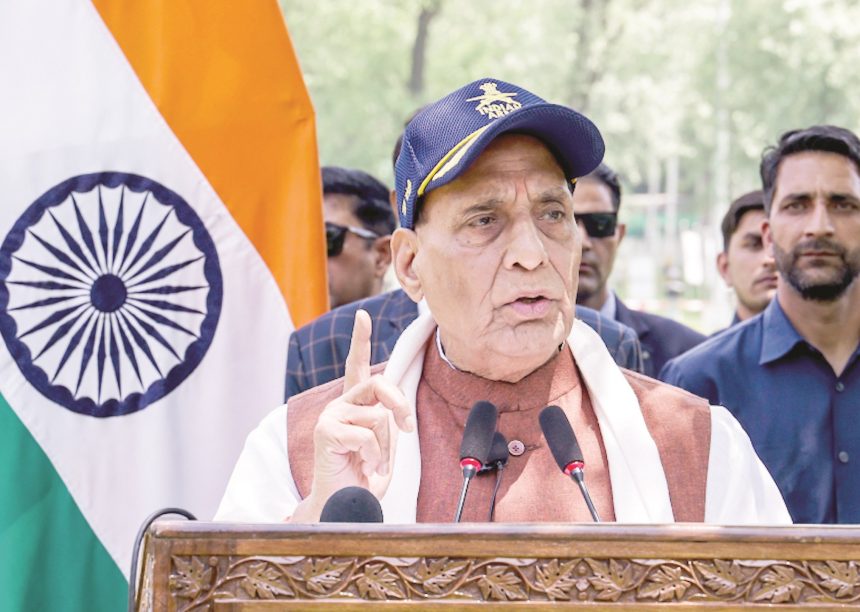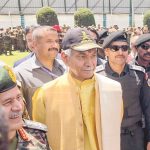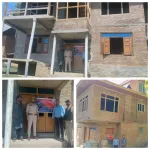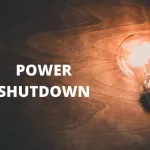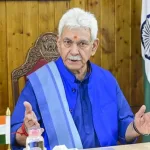SRINAGAR, MAY 15: In a decisive shift in India’s national security posture, Defence Minister Rajnath Singh on Wednesday said that any terror attack on Indian soil would henceforth be treated as an act of war — underscoring a hardened counter-terrorism policy under Prime Minister Narendra Modi.
Addressing Army personnel at the Badami Bagh Cantonment in Srinagar, Singh said, “If Pakistan continues to support terrorism, it will have to pay a heavier price.” He made it clear that while India remains a nation committed to peace, any challenge to its sovereignty will be met with forceful retaliation.
Singh hailed Operation Sindoor as the most significant anti-terror operation in India’s history and a powerful message of intent. “Operation Sindoor was more than a military manoeuvre — it was a message. It fulfilled every soldier’s dream of reaching every terrorist hideout and eliminating them,” he said. “Terrorists killed Indians based on religion; we targeted them for their deeds. It was our dharma to act.”
He added that the operation has sent a loud and clear message to terror groups operating from Pakistan and their backers: they are no longer safe anywhere. “Our forces demonstrated precision and left the counting of casualties to our adversaries,” Singh remarked.
Addressing the threat of nuclear escalation by Pakistan, the Defence Minister said that India would not be deterred by what he called Islamabad’s “nuclear blackmail.” He questioned whether such weapons were safe in the hands of what he described as an irresponsible and rogue nation, urging the international community to place Pakistan’s nuclear arsenal under the supervision of the International Atomic Energy Agency (IAEA).
Singh also referred to the recent Pahalgam terror attack, calling it an attempt to fracture India’s social fabric. “Our Armed Forces responded by striking at the heart of the enemy,” he said. He recalled Pakistan’s earlier promises of non-interference, including a commitment made to former Prime Minister Atal Bihari Vajpayee more than two decades ago, and accused Islamabad of betrayal. “Pakistan must stop harbouring anti-India elements and cease allowing its soil to be used against us,” Singh said.
In a sharp economic comparison, Singh noted that while Pakistan is seeking financial assistance from the International Monetary Fund (IMF), India today belongs to the group of donor countries that contribute to the IMF to assist struggling economies. The contrast, he implied, was a reflection of the two countries’ diverging global credibility and governance.
Singh also reiterated India’s red lines in its engagement with Pakistan, stating that “no unwarranted action should come from across the border.” He reiterated the Prime Minister’s stance: “Talks and terrorism cannot go hand-in-hand. If talks happen, they will be on the issues of terrorism and Pakistan-occupied Kashmir (PoK).”
The Defence Minister paid homage to the civilians killed in the Pahalgam attack and saluted the soldiers who laid down their lives during Operation Sindoor. He commended the courage of injured personnel and wished them a speedy recovery. Singh also expressed gratitude to the troops who destroyed Pakistani posts and bunkers in retaliatory strikes. “I come here with a message from the people of India — we are proud of our Armed Forces,” he said.
He affirmed the government’s commitment to equipping the military with next-generation weapons, missile defence systems, and drones, much of which is being developed domestically. “Connectivity along the Line of Control (LoC) and the Line of Actual Control (LAC) has improved significantly. The government is doing its utmost to match the dedication of our soldiers,” he said.
Concluding his address, Singh assured the troops that the Government and the citizens of India stand firmly with them. “With your cooperation, we will root out terrorism and ensure no one dares to threaten India’s sovereignty,” he said.
The event was attended by Jammu & Kashmir Lieutenant Governor Manoj Sinha, Chief Minister Omar Abdullah, Chief of Army Staff General Upendra Dwivedi, and other senior officials of the Indian Army.


